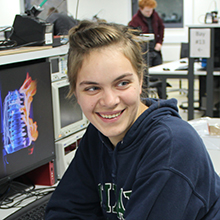This research-led MSc takes a contemporary approach and covers the fundamental aspects of traditional symbolic and sub-symbolic aspects.
The programme will give you a solid awareness of the key concepts of artificial intelligence. You will also learn the techniques that form the current basis of machine learning and data mining. You will develop a wide-ranging skill set that supports further study or that you can use in application development.
As a result of the leading research being undertaken at Southampton, the course is able to offer a wide range of options that cover state-of-the-art modern techniques, which directly reflect research directions in ECS. These include:
- intelligent agents
- complexity science
- computer vision
- robotics
- machine learning techniques, such as support vector machines and deep learning
In addition, students may be able to access events and seminars run by the University's Centre for Machine Intelligence.
View the programme specification for this course for 2020/21 entrants
View the programme specification addendum for this course for 2020/21 entrants
Accreditation
Accredited by the British Computer Society (BCS) on behalf of the Engineering Council as meeting the requirements for Further Learning for registration as a Chartered Engineer. Candidates must hold a CEng accredited BEng/BSc (Hons) undergraduate first degree to comply with full CEng registration requirements.
Programme Structure
The programme has been designed to maximise student choice by allowing you to tailor the structure to suit your own interests. You can choose areas that reflect your personal interests and work on an individual project. You will however, also take a number of compulsory modules to ensure you are exposed to key topics in all areas.
To Apply
You can apply for the programme through the University of Southampton's online postgraduate application system. Visit how to apply for more information. Please note that we belong to the Faculty of Physical Sciences and Engineering (FPSE).
The deadline for new applications to this course is 31 July each year.
Key Facts
Southampton is a University Partner of The Alan Turing Institute, the UK’s national institute for data science and artificial intelligence
Southampton University has pioneered many of the most important advances in computer science and web technology of the past 10 years
We are in the top 10% in the UK for the volume and quality of our Computer Science research (REF 2014)
100% of our Computer Science research impact is world-leading or internationally excellent (REF 2014)
Southampton is ranked in the top 100 universities for Computer Science in the 2018 QS World Rankings, and top 10 in the UK
We are in the UK top ten for Computer Sciences (Guardian University Guide, 2019)
We are recognised as an Academic Centre of Excellence in Cyber Security Research by the UK Government and our academics have played a leading role in establishing a European Data Science Academy


